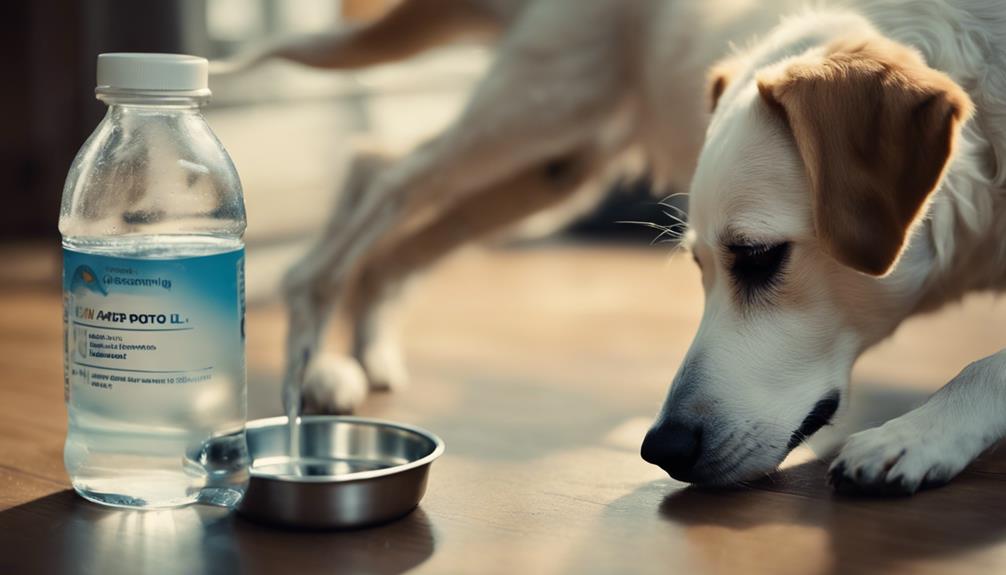Dry, flaky skin in dogs can be a common issue that leads to discomfort, itchiness, and redness. Addressing this concern requires a comprehensive approach that considers various factors impacting skin health. From environmental influences to nutritional deficiencies, finding the right moisturizing solution is crucial.
By understanding the importance of hydration, proper nutrition, and suitable skincare practices, pet owners can significantly alleviate their dog's skin problems. Stay tuned to discover practical tips and recommendations on effectively moisturizing your dog's dry, flaky skin to provide much-needed relief from itchiness and redness.
Key Takeaways
- Use humidifiers to combat dry air and maintain skin moisture.
- Ensure proper nutrition with essential fatty acids for healthy skin.
- Limit bathing frequency to prevent stripping skin oils.
- Address underlying health issues or parasites impacting skin health.
Understanding Your Dog's Skin Condition
Understanding your dog's skin condition is essential for identifying the root cause of any dryness or irritation they may be experiencing. The skin is the body's largest organ and serves as a protective barrier against external elements.
Examining your dog's skin for signs of dryness, redness, flakiness, or any abnormalities is crucial. Factors such as dry air, nutritional deficiencies, excessive bathing, parasites, and underlying health conditions can all contribute to skin issues.
Observing your dog's behavior, checking for bald patches, itchiness, or unusual odors, and consulting with a veterinarian for a proper diagnosis are steps towards understanding and addressing your dog's skin condition effectively.
Taking proactive measures to maintain your dog's skin health is key to ensuring their overall well-being.
Identifying Common Causes of Dryness
Dry skin in dogs can be attributed to various factors such as dry air, nutritional deficiencies, excessive bathing, parasites, and underlying health conditions. Identifying these causes is crucial in addressing your dog's dry, flaky skin. Here is a breakdown of common causes:
| Causes | Description | Examples |
|---|---|---|
| Dry Air | Low humidity leading to skin dryness | Arid climates, winter seasons |
| Nutritional Deficiencies | Lack of essential fatty acids | Omega-3 and omega-6 deficiencies |
| Excessive Bathing | Stripping away skin oils through frequent baths | Bathing too often |
Understanding these factors can help you take targeted steps to improve your dog's skin health.
Importance of Proper Nutrition for Skin

Proper nutrition plays a fundamental role in maintaining optimal skin health for dogs, ensuring they receive essential nutrients to support skin function and prevent dryness. Fatty acid deficiencies, particularly omega-3 and omega-6, can lead to dry skin issues in dogs.
Checking for the AAFCO Statement on dog food can help confirm the adequacy of essential nutrients. Omega-3 and omega-6 supplements are known to promote skin and coat health, aiding in combating dryness.
Consulting a veterinary nutritionist for tailored diet planning can be beneficial, especially for dogs with specific dietary needs. Choosing supplements approved by the National Animal Supplement Council or recommended by a vet can further enhance the skin health of dogs.
Choosing the Right Fatty Acid Supplements
When selecting fatty acid supplements for your dog's skin health, it is essential to consider the specific omega-3 and omega-6 requirements recommended by veterinary professionals. To ensure you are choosing the right fatty acid supplements, consider the following:
- Omega-3 Sources: Look for supplements containing fish oil, flaxseed oil, or algae oil for a good source of omega-3 fatty acids.
- Omega-6 Balance: Ensure the supplement provides an appropriate balance of omega-6 fatty acids like linoleic acid to support skin health.
- Quality and Purity: Opt for supplements that are pure, free from contaminants, and specifically designed for pets.
- Consultation: Always consult your veterinarian before introducing any new supplements to your dog's diet to determine the appropriate dosage and suitability.
Establishing a Bathing Routine

To maintain optimal skin health for your dog, establishing a consistent bathing routine is essential. Bathing helps remove dirt, allergens, and excess oils that can contribute to dry, flaky skin. However, it is crucial to avoid overbathing, as this can strip away the skin's natural oils, leading to further dryness and irritation.
Most dogs typically only need baths a few times a year, unless recommended otherwise by a veterinarian. When bathing your dog, opt for gentle, moisturizing shampoos, such as oatmeal-based ones, that can help soothe dry skin. Ensure to rinse off all shampoo residue thoroughly to prevent any potential irritation.
Consistency in your bathing routine can play a significant role in maintaining your dog's skin health and overall well-being.
Using Oatmeal Shampoos for Relief
An effective solution for relieving dry skin in dogs involves incorporating oatmeal shampoos into their grooming routine. Oatmeal shampoos can help soothe irritated skin, reduce itchiness, and improve overall skin health. When choosing an oatmeal shampoo for your dog, opt for products specifically designed for sensitive skin and free from harsh chemicals. Follow the instructions on the shampoo bottle for the best results.
Here are some key points to consider when using oatmeal shampoos for relief:
- Select a gentle oatmeal shampoo formulated for dogs with dry, flaky skin.
- Ensure the shampoo is thoroughly rinsed off to prevent residue buildup.
- Use lukewarm water and massage the shampoo into your dog's coat for effective moisturizing.
- Incorporate oatmeal baths into your dog's grooming routine as needed, avoiding excessive bathing.
Recognizing Symptoms of Parasitic Infections

Symptoms indicative of parasitic infections in dogs include skin irritation, hair loss, and persistent scratching. These signs can signal the presence of parasites like mites or conditions such as ringworm that affect your dog's skin health. Recognizing these symptoms early on is crucial for prompt treatment and alleviation of discomfort for your furry companion. Here is a visual representation of common symptoms associated with parasitic infections in dogs:
| Symptom | Description |
|---|---|
| Skin Irritation | Redness, inflammation, or rash on the skin. |
| Hair Loss | Thinning coat or bald patches on the skin. |
| Persistent Scratching | Constant itching or scratching behavior. |
| Lethargy | Unusual tiredness or lack of energy. |
| Changes in Appetite | Loss of appetite or increased hunger. |
Seeking Veterinary Diagnosis and Treatment
Seeking a veterinary evaluation is essential for accurately diagnosing and treating your dog's skin conditions. To ensure your furry friend receives the best care possible, consider the following steps:
- Professional Assessment: A veterinarian can conduct a thorough examination to identify the root cause of your dog's dry, flaky skin.
- Diagnostic Tests: Blood tests, skin scrapings, or biopsies may be necessary to pinpoint any underlying issues contributing to the skin condition.
- Tailored Treatment Plan: Based on the diagnosis, your vet can recommend specific treatments such as medicated shampoos, supplements, or medications.
- Follow-Up Care: Regular check-ups can monitor your dog's progress and make any necessary adjustments to the treatment plan for optimal skin health.
Incorporating Humidifiers in Your Home

Using a humidifier in your home can significantly benefit your dog's skin health by helping to combat dry air conditions. Low humidity levels can lead to moisture loss in your dog's skin, contributing to dryness and itchiness. By adding moisture to the air, humidifiers can help maintain the skin's elasticity and prevent it from becoming overly dry.
This is especially important in arid climates or during the winter months when indoor heating systems can further deplete humidity levels. Humidifiers are beneficial for both pets and humans in maintaining optimal skin health, making them a valuable addition to your home environment to support your dog's skin wellness.
Adjusting Your Home Heating System
To further enhance the skin health of your dog, consider adjusting your home heating system to create a more favorable environment that helps combat dry air conditions.
- Use a Humidifier: Introduce a humidifier to add moisture to the air, particularly in heated areas.
- Optimal Temperature Control: Maintain a moderate temperature to prevent the air from becoming too dry.
- Regular Maintenance: Ensure your heating system is properly maintained to avoid exacerbating dry skin issues.
- Consider Air Circulation: Use fans or open windows periodically to allow fresh air circulation and prevent stagnant, dry air from accumulating.
Ensuring Sufficient Hydration for Your Dog

Ensuring your dog maintains proper hydration levels is essential for supporting overall skin health and well-being. Adequate water intake helps maintain skin elasticity and prevent dryness, itchiness, and redness. Here is a table to guide you on ensuring your dog stays hydrated:
| Hydration Tips for Your Dog | Benefits |
|---|---|
| Provide fresh water daily | Prevents dehydration |
| Monitor water intake | Ensures sufficient hydration |
| Add wet food to the diet | Increases moisture consumption |
Protecting Your Dog's Skin in Extreme Weather
Proper protection against extreme weather conditions is crucial for maintaining your dog's skin health and preventing potential dryness and discomfort.
- Limit Sun Exposure: Just like humans, dogs can suffer from sunburn. Limit your dog's time in direct sunlight, especially during peak hours, and provide shaded areas for them to rest.
- Protective Clothing: In cold weather, consider using dog-specific clothing like jackets or sweaters to protect their skin from harsh winds and cold temperatures.
- Moisturizing Balms: Use dog-friendly moisturizing balms on exposed areas like paw pads to prevent cracking and dryness caused by extreme temperatures.
- Regular Paw Checks: Inspect your dog's paws regularly for signs of damage or irritation from hot pavement in summer or ice and salt in winter.
Consulting a Veterinary Nutritionist for Advice

Seeking guidance from a veterinary nutritionist can provide invaluable insights into addressing your dog's specific dietary needs for optimal skin health. A veterinary nutritionist is equipped with the knowledge and expertise to analyze your dog's current diet and recommend necessary adjustments to ensure they are receiving essential nutrients like omega-3 and omega-6 fatty acids crucial for skin health.
By consulting a veterinary nutritionist, you can receive personalized recommendations on commercial dog foods or homemade diets tailored to your dog's individual requirements. Additionally, they can advise on the appropriate use of supplements approved by reputable organizations like the National Animal Supplement Council to support your dog's skin and coat health.
Veterinary nutritionists play a vital role in optimizing your dog's nutrition to alleviate dry, flaky skin issues.
Monitoring Progress and Adjusting Care
To ensure the effectiveness of the dietary adjustments recommended by a veterinary nutritionist, closely monitoring your dog's skin condition and overall health is essential in determining the progress and making necessary care adjustments. Monitoring progress includes observing changes in skin texture, itchiness levels, and coat shine.
Additionally, tracking any new symptoms that may arise, such as redness or inflammation, is crucial. Regularly noting your dog's energy levels and behavior can provide insights into their overall well-being.
Adjusting care involves consulting with the veterinary nutritionist to fine-tune the diet plan if improvements are not satisfactory. Moreover, discussing any concerns with your veterinarian promptly can help address any underlying issues affecting your dog's skin health.
Conclusion
In conclusion, addressing dry, flaky skin in dogs requires a comprehensive approach that includes:
- Understanding the underlying causes
- Providing proper nutrition
- Establishing a bathing routine
- Ensuring hydration
- Protecting against environmental factors
By implementing these strategies and seeking guidance from a veterinary nutritionist when needed, pet owners can effectively moisturize their dog's skin, alleviating itchiness and redness to improve their overall well-being.




